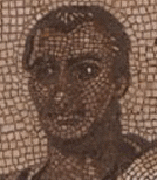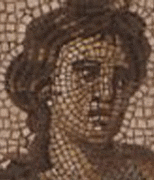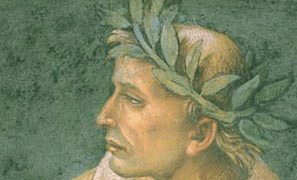



LATIN [HOME]
AUDIO FILES
LATIN READER
GUIDE & MORE
TO WHEELOCK'S
AUTHORS
On 9/11:
EX EDITORE
Sunt lacrimae rerum et mentem mortalia tangunt.
O tempora . . .! Anxious times such as these (and yet when have there been times quite so perilous?) compel our re-examination of everything in our lives, of what is truly important to us, and who we are, and what we do. Freud suggested that there were two powerful palliatives for coping with anxiety--love and hard work. I am certain that all of us in the aftermath of that dreadful September 11 reached out first to those we love with renewed intensity.
I feel equally certain, however, that those of us who teach young people have likewise re-examined our labor, what it is we are doing in our classrooms, and why, and how we can help our students through these difficult times. I know that the two high points of my day, every day, over the recent weeks since the September 11 attacks have been when I come home to my wife in the evening, for hugs and talk of the day's activities at work and the briefest possible review of events in the crazy world outside, and earlier, at the start of the day, when I walk into my classroom uplifted by the sense that I truly can help my students in at least some small but meaningful ways, perhaps more than ever before. Like the rest of us who have felt helpless in the immediate aftermath of the terrorist assault and searched for some useful way to respond to the nation's crisis, I have given blood and contributed to the Red Cross and other relief agencies--important things for all of us to do, and to keep on doing.
But I firmly believe that by continuing also to do what we do best, teaching our students and remaining sensitive to their emotional as well as intellectual needs, we render an important service to our country. President Bush and Mayor Giuliani in the days following September 11 urged upon New Yorkers and all Americans the tenet that we could best serve the nation by getting back to our lives and our jobs with fortitude and determination; most of us were indeed back in our classrooms on September 12. And when we are in those classrooms, although we are not nurses or doctors or firemen or policemen or soldiers, we are performing valuable services nonetheless.
We teach our students the fine points of language, so they can read, and write, and speak, and think, and understand with greater precision and nuance. We teach them the history of the ancient Mediterranean--and when in the lives of our students have the experiences of the Greco-Roman world in its interactions with the middle east been more resonant with events in our own world? We teach them the power of ancient religion and philosophy--and when have the lessons of Stoicism, for example, been more useful to our students, and ourselves, than in these past weeks? We teach them literature, whose inestimable value to each of us, at every stage and in every activity of our lives, was eloquently defined by Cicero in his defense of the poet Archias (Pro Archia Poeta 7.16):
"Si ex his studiis delectatio sola peteretur, tamen, ut opinor, hanc animi remissionem humanissimam ac liberalissimam iudicaretis. Nam ceterae neque temporum sunt neque aetatum omnium neque locorum; at haec studia adulescentiam alunt, senectutem oblectant, res secundas ornant, adversis perfugium ac solacium praebent, delectant domi, non impediunt foris, pernoctant nobiscum, peregrinantur, rusticantur."
"Even if mere entertainment were our only objective in the study of literature, you would still, in my opinion, regard this pursuit as the most humanizing and liberating of intellectual activities. For no other pursuit is appropriate to all times, all ages, all situations; but this study nurtures our youth, delights our old age, brightens the good times, and provides a refuge and comfort in bad times; literature brings us pleasure at home, does not hamper us at work, and is the companion of our nights, our travels, our country retreats."
Cicero speaks elsewhere, in his treatises De Officiis and De Republica, on the ethics of war, acknowledging that it is sometimes inevitable but that the first recourse in international conflict resolution should always be to negotiation rather than to violence, cum illud proprium sit hominis, hoc belvarum ("since the one course of action is appropriate to humankind, the other to beasts," De Off. 1.11.34). Homer and Vergil teach us and our students lessons of war as well; they teach us to view conflict from both sides--from Hector's as well as Achilles', from Turnus' as well as Aeneas'--and the closing scene of the Aeneid demonstrates as effectively as any literary text of any age that there can be ambiguity in conquest.
This is not to say that ancient thinkers indulged in moral relativism to the extent that far too many moderns do. The Stoics believed in moral absolutes: it is absolutely immoral and cowardly, they would surely have said, to deliberately target civilian populations in a surprise attack in an undeclared, terroristic war. But Vergil teaches us the difficulty of perfectly comprehending those absolutes and translating them into just action.
And so this is why we do what we do, and why it is important--to our students, to our nation, and indeed to ourselves. We help our students toward greater precision in language and communication; we discuss with them the rich and oftentimes profound lessons of philosophy and history and literature; and our ultimate goal is that they--and we, as we learn along with them--should better understand moral right and just action. Our soldiers and policemen and firemen and doctors and nurses (may God protect them all) guard and heal our bodies; we teachers of Latin, Greek, and classical humanities, in our quiet, modest, but important way, and alongside other teachers and school counselors and social workers and the clergy, help build our students' minds and heal their souls.
R. A. LaFleur
Originally Published in The Classical Outlook, Fall 2001
And don't forget, LATINA EST GAUDIUM--ET UTILIS!
Discussion of recording online audio for Wheelock's Latin, John Keane Studios, Athens, GA (internationally known for its recordings of REM, Widespread Panic, Cowboy Junkies, and others)
|
The Official Wheelock's Latin Series Website is sponsored by Martha Wheelock, Deborah Wheelock Taylor, Richard A. LaFleur, and HarperCollinsPublishers (www.harpercollins.com) to publicize not only the Wheelock's Latin Series but also related materials from HarperCollins and other publishers and websites. Last updated October, 2021. This site was designed by Ginny Lindzey and Richard A. LaFleur,
and is administered by Kay Stanton. For technical questions
on the functioning and management of this website, or suggestions
for additional links for our Links page, please contact support
at webmaster@wheelockslatin.com. |

